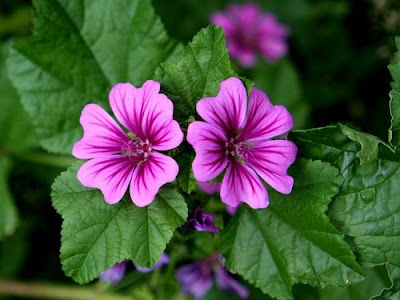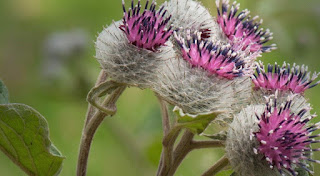Mallow is a plant rich in mucilage with beneficial properties on the intestine and throat. Find out how and when to use mallow and its contraindications. Mallow (Malva sylvestris) is a plant belonging to the Malvaceae family and probably originally from North Africa. Thanks to its
emollient and anti-inflammatory properties, mallow is useful for coughing, but also for regulating the function of the intestine.
The
flowers and in particular the leaves of the mallow are rich in mucilages, which give the plant emollient and
anti-inflammatory properties for all the soft tissues of the body. These active ingredients work by coating the mucous membranes with a viscous layer that protect them from irritating agents. For this reason, the use of mallow is indicated for coughing, in catarrhal forms. To hydrate and flare the colon, and purify the intestines.
Mallow regulates the intestine thanks to its sweet laxative action, due to the ability of the mucilage to form a sort of gel, which mechanically acts on the stool and therefore facilitating its elimination.The treatment of constipation with mallow is non-irritating and non-violent , for which it is indicated in pregnancy, for
children and for the elderly. It also helps heal vaginitis, pharyngitis and all irritations of the oral cavity, such as abscesses, gingivitis and stomatitis.
Mallow how to use
Decoction: 1 tablespoon of mauve
leaves and flowers, 1 cup of water Pour the leaves and flowers into cold water.
Light the fire and bring to a boil. Boil a few more minutes, turn off the heat, cover and leave to infuse for 10 minutes.Filter the infusion and drink it when needed in case of cough, colitis or constipation.
Cold macerated: 10-15 grams of chopped flowers and leaves left to macerate in cold water for at least 5 hours. From this operation the best extraction of mucilage is obtained. The herbal tea with mallow is also excellent to drink in the morning, for its deflating properties and to regulate intestinal activity.
External use
With the decoction, once cooled, you can find benefit by gargling, in case of inflammation of the throat or by washing in case of vaginal irritation.
Mallow contraindications
Mallow is a natural remedy that does not present any kind of contraindication, as long as you do not abuse it or you are not aware of intolerances towards the constituent principles of the plant such as malvina and malvidina.
Mallow description
Perennial plant with bushy habit, erect and prostrate. The stem (60-80 cm), woody at the base, bears petiolate leaves with 5-7 lobes, with toothed margin, covered with hairs. The flowers, which sprout in the axil of the leaves, are pinkish-purple with darker streaks.
Frequent in meadows and uncultivated places on the plains and hills, it is often spontaneous in
gardens and in gardens.
Mallow in history
The emollient virtues of mallow have been known and appreciated since ancient times, in fact, its name derives from the Latin term mollire - capable of softening. The Greeks instead called it malachè, which
means to make it soft. Hippocrates recommended it for its emollient and laxative properties, but it was also used as food by poor people. In fact, it is excellent in soups or boiled and seasoned with oil and salt.




Comments
Post a Comment